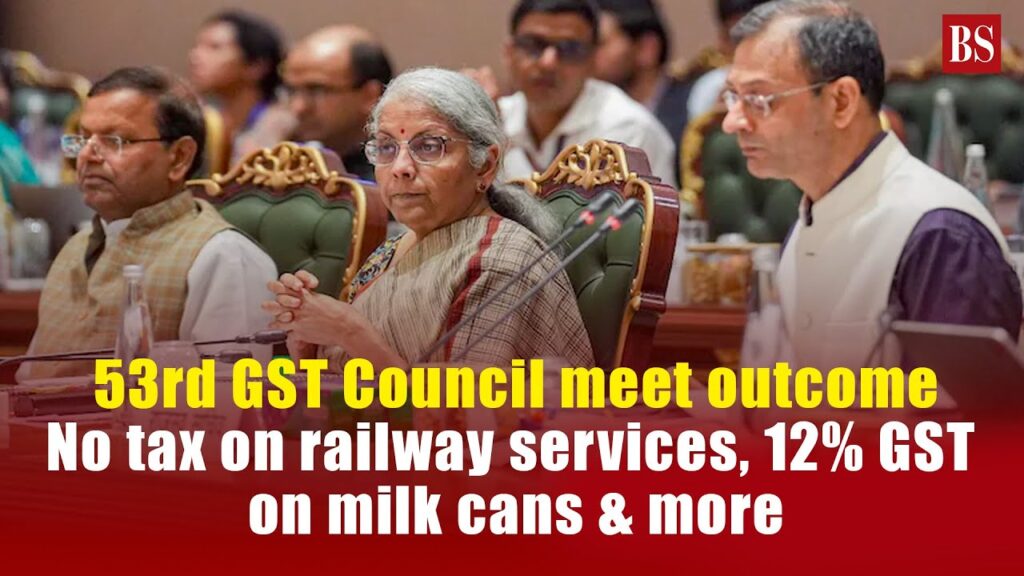A slew of key decisions were announced at the 53rd GST Council meeting held on Saturday, June 22, in New Delhi under the chairmanship of Finance Minister Nirmala Sitharaman.
Among the prominent decisions was to rollout a pan-India Aadhaar-based biometric authentication for GST registration. This would allow the tax authorities to combat fraudulent input tax credit claims made through fake invoices.
The Council also decided to help the small taxpayers by extending the deadline for furnishing details and returns in form GSTR 4 to June 30.
This is the first GST Council following the recently concluded Lok Sabha elections. The last time when the panel had met dates back to October 7, 2023, when it imposed a 28% GST on online gaming, casinos, and horse racing.

he key decisions taken at the meeting
Railway services get GST exemption
The Finance Minister announced that services provided by the Indian Railways to common people, such as platform tickets, waiting room facilities, battery-operated car services, etc will not be subjected to GST.
Aadhar-linked biometric authentication
The GST Council has made Aadhaar-based biometric authentication mandatory for all new registrations in India to streamline the process and help weed out fraudulent input tax credit claims.
Interest on penalties on tax demand notice waived off
The council meeting also announced a waiver on interest penalties on tax demand notices issued under Section 73 for the fiscal years 2017-18, 2018-19, and 2019-20, provided the full tax amount is paid by March 2025.
12% GST rate imposed on milk cans
The GST Council proposed to levy a uniform 12% GST on all milk cans, including those made of steel, iron, and aluminium, irrespective of their use. The Council also recommended a uniform 12% GST rate on all carton boxes and cases of both corrugated and non-corrugated paper or paper board, This will particularly help the apple growers of Himachal Pradesh and the Kashmir valley, the Finance Minister said. All sprinklers, including fire water sprinklers, would also attract 12% GST, the council noted.
Hostel accommodation exempted from GST
The GST council also exempted hostel services provided outside educational institutions up to a limit of ₹20,000 per person per month.
Insertion of functionality, through a form – GSTR-1a
The council recommended the introduction of a new functionality via form GSTR-1A. It will help taxpayers add details from the current tax period in case they’ve missed them in the initial reporting.
GST rates on fertilizers
Currently, there is a 5% GST on fertilizers and raw materials like Sulphuric acid and Ammonia have 18% GST. However, the GST council meeting today recommended exempting the fertilizer sector from the current 5% GST, referring it to the Group of Ministers on rate rationalisation. The council also deliberated on the recommendations made by the Standing Committee on Chemicals and Fertilizers in February to slash GST on nutrients and raw materials to benefit the fertilizer manufacturing companies.
Other important decisions
The GST Council also wanted the deadline for invoice or debit notes under section 16(4) of the CGST Act filed up to 30-11-2021, for the financial year 2017-18, 2018-19, 2019-20, and 2020-21 may be considered as 30-11-2021.
The monetary limit for filing an appeal by tax dept. Is set at 20 lakh for GSTAT, ₹1 crore for HC and ₹2 crore for SC.
The maximum amount of pre-deposit for filing an appeal before the appellate authority has been reduced to ₹20 Cr from ₹25 Cr for CGST and SGST.
Pre-deposit for filing an appeal before the tribunal has been reduced to 20% and ₹20 Cr each for CGST and SGST.
The time limit to file GSTR-4 extended till June 30.
Change in the law of providing the time limit for filing an appeal before the tribunal will start from the date the government notifies GSTAT.